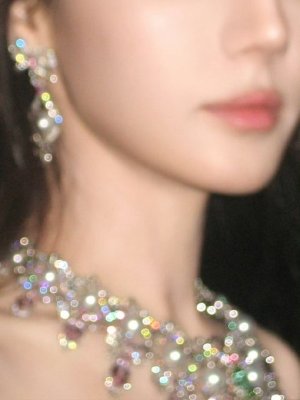
This review may contain spoilers
Love, Laughter, and Family Ties
Perfect Match is a drama that truly shines due to its stellar casting. The actresses did an outstanding job in bringing their characters to life, making them not only admirable but also genuinely funny and loveable. The women of the Li family were particularly captivating, each displaying a unique blend of loyalty, intelligence, humor, and diligence. Their strong family bonds were beautifully portrayed, making it easy for viewers to grow attached to each of them. It was refreshing to see such strong female characters who uplifted each other rather than belittling others.The standout performances came from Wang Xing Yue and Lu Yu Xiao. Despite the script not fully utilizing their exceptional acting abilities, they still delivered memorable performances. Winwin also deserves special mention for his portrayal of Yang Xian, showcasing his impressive acting skills. Huangyang Tian Tian, though young, proved to be very promising with her compelling performance.
While the cast delivered exceptional performances, the script itself had notable flaws. At times, it carried misogynistic undertones that could be disappointing; however, the actors’ dedication helped soften these moments, making them less apparent. Another significant letdown was the lack of a preview into Kang Ning and Chai An’s married life, despite them being the supposed main couple. This omission left a sense of incompleteness, especially given the buildup of their relationship throughout the drama. Similarly, Mister She, Madam Li’s son, was a character with great potential, yet he was only present for three episodes. His character could have been explored further, as his presence added another layer to the family dynamic.
Among the various couples in the drama, Hao De and Shen Hui Zhao stood out as the most compelling. Their relationship was well-developed, and their dynamic was beautifully explored. Hao De’s honesty and Shen Hui Zhao’s integrity made their love story believable and heartfelt. The last couple added a humorous element to the show, though their dynamic sometimes leaned into unnecessary violence. Nevertheless, their relationship successfully depicted the wild yet amusing nature of young love.
Leshan was another entertaining character, standing out with her unwavering honesty and upright nature. Her humorous personality added much-needed lighthearted moments to the series. Special mention must go to Fan Liang Han, whose natural comedic timing made him the funniest character in the show.
Beyond the romance and comedy, Perfect Match excelled in its portrayal of family dynamics. From the deep sisterly bonds to the depiction of a devoted single mother willing to do anything for her daughters, the drama captured the essence of familial love. Even the sons-in-law had their own secret alliances, adding an extra layer of warmth and humor and their commitment to their women and the family was also something nice. The drama successfully conveyed the comforting and supportive nature of a true family, making it one of its strongest aspects.
Overall, I would rate Perfect Match an 8.5 out of 10. Despite the script’s imperfections, unnecessary scenes, and missing moments, it remains an enjoyable and well-acted drama. With stronger writing and better utilization of its talented cast, it could have been even more impactful.
Was this review helpful to you?

MUST WACTCH IT !
Many dramas still manage to surprise me, but 7 Relics of Ill Omen was special for a whole different reason — it was actually my first Chinese sci-fi drama. I approached this Chinese sci-fi drama with minimal expectations, only to find myself completely absorbed by its remarkable depth, meticulous storytelling, and impressive execution.The script is undeniably one of the show's greatest strengths. It is intelligent, well-paced, and thoughtfully layered. Each narrative arc serves a distinct purpose — not only pushing the story forward but also allowing viewers to immerse themselves, form theories, and anticipate twists without feeling overwhelmed. The structure is elegant yet complex, creating space for reflection while maintaining steady momentum. It respects the audience's intelligence — a refreshing rarity in the genre.
Visually, the production quality exceeded my expectations. The effects blend seamlessly into the story's futuristic world, enhancing rather than distracting from the narrative. Every detail, from set design to visual effects, reflects a commitment to world-building that feels tangible and believable. Even the soundtrack is masterfully curated — the OST matches the tone of each scene with precision, amplifying the emotions and tension at all the right moments.
Casting-wise, the series mostly hits the mark. Song Wei Long as Luo Wen and Liu Han Cun as Mu Dai deliver outstanding performances, bringing nuance and vulnerability to their characters. Watching them navigate such a rich, sci-fi universe was a delight, and they carried the emotional core of the story with authenticity. The supporting cast also deserve recognition — their characters were more than just background noise; they contributed layers to the overarching narrative, and following their personal journeys added depth and humanity to the high-concept world.
However, the one element that slightly faltered for me was the portrayal of the leopard woman. Her arc — particularly her involvement with Luo Wen — felt muddled and at times disconnected from the otherwise cohesive plot. It introduced a layer of confusion that momentarily disrupted the otherwise sharp narrative flow. Yet, even with that flaw, the drama never lost its grip on me.
What elevated 7 Relics of Ill Omen even further was its subtle handling of romance. Rather than overwhelming the core sci-fi mystery, the romantic undertones were woven in with restraint, allowing the main plot to shine while still offering moments of emotional resonance.
In the end, 7 Relics of Ill Omen*isn't just another sci-fi drama — it's one of those rare shows that quietly sneaks up on you and leaves a real impression. It made me think, kept me guessing, and even made me care about the characters far more than I expected. It's hard to find a Chinese drama in this genre that feels this solid and well-crafted. Honestly, I was hooked by its ambition, the heart behind the story, and how well it all came together. I just wish more people had the chance to experience it the way I did.
Was this review helpful to you?

A breathtaking, emotional, and empowering fantasy ^^
I can confidently say Love in the Clouds is one of my absolute favorite dramas of 2025. I had high expectations, and it didn’t just meet them — it exceeded them. From the story to the acting, everything felt so heartfelt and beautifully crafted.At first, the pacing is a bit slow, but once the world opens up, it becomes such an emotional and thrilling journey. The story balances fantasy, love, and identity with a sincerity that’s rare. What really pulled me in was how Ming Yi (played by LYX) isn’t just a warrior — she’s a woman fighting to reclaim her identity in a world that refuses to see her. LYX was phenomenal. Her performance was layered, raw, and endlessly moving. She portrayed strength and fragility so naturally that I found myself rooting for her every second.( I can be totally biased about LYX because she nailed it and once again showed her greatness as actress and her versatility).
And then there’s Ji Bo Zai (HMH) — what a character! He’s powerful, sharp, and mysterious, yet what really stood out was his emotional intelligence. He never once belittled Ming Yi for being a woman. Instead, he uplifted her, supported her, and made sure she could shine on her own terms. That’s what made their relationship so special — it wasn’t about dominance or saving each other, it was about mutual respect and growth. Their chemistry was absolutely off the charts — intense, funny, tender, and magnetic all at once.
I also have to say: the supporting cast deserves so much love. Every single one of them added something meaningful to the story — the friends, the princess, the beasts, the secondary couples — they made the world of Love in the Clouds feel alive. They were touching, expressive, and often delivered moments that genuinely made me tear up.
Visually, the show is just stunning. The CGI, the costumes, and the cinematography are pure art. Every frame looks like a painting. And the OSTs — especially “Love in the Clouds” and “Pretending It’s Nothing” — perfectly capture the emotions of each scene. I still listen to them because they bring back all the feelings this drama gave me.
The ending? Absolutely satisfying. It’s so refreshing to see a xianxia drama where love and hope win without unnecessary sacrifices. Ming Yi and Ji Bo Zai got the ending they truly deserved — a peaceful and beautiful one.
This drama is about love, equality, and healing. It’s about learning to embrace who you are and finding someone who sees you for exactly that. I laughed, I cried, I fell in love. LYX once again proved why she’s one of the most versatile actresses of her generation.
Love in the Clouds is emotional, empowering, and simply unforgettable. If you love fantasy with real heart and characters that stay with you, don’t miss this one. 🌙💫
Was this review helpful to you?

THE GLORY in all its glory
The Glory is a captivating Chinese drama that skillfully weaves themes of revenge, suspense, and personal justice. Unlike many historical dramas, it does not dwell on romance but instead keeps its focus on unraveling secrets, maintaining a gripping storyline from start to finish. Like The Double, it never strays from its central revenge plot, ensuring an intense and immersive viewing experience.The drama is relentless in its execution, offering suspense and thrill without unnecessary distractions, making every revelation all the more impactful. One of the strongest aspects of The Glory is its portrayal of female solidarity. The drama highlights how women, despite occasional conflicts, ultimately stand together and support one another. Han Yan is a prime example of a noblewoman who seeks to protect rather than destroy, making her a compelling protagonist who challenges conventional revenge drama tropes. Her ability to navigate a ruthless world without sacrificing her principles is one of the drama’s most admirable aspects.
The relationship between Han Yan and her mother is one of the most emotionally charged aspects of the drama. The pain of separation, the struggle of loss, and the complex layers of love and misunderstanding make their bond deeply moving. Han Yan’s mother, though appearing to push her daughter away and even claiming to hate her, is herself a victim of injustice, forced into cruelty by her circumstances. Instead of resenting her, Han Yan chooses to stay, seeking understanding rather than rejection. This layered dynamic adds significant depth to the narrative, exploring the themes of maternal sacrifice, emotional wounds, and the desire to heal broken relationships.
The drama also delves into the concept of home—not merely as a physical place but as a feeling of warmth and love. Han Yan’s journey is not just about revenge but about finding a true home, one where she is accepted and cherished. This theme resonates throughout the series, emphasizing that home is wherever love and belonging exist, not necessarily tied to blood relations but to the bonds forged through shared struggles and unwavering support.
Chen Duling delivers a stellar performance, bringing layers and complexity to Han Yan. Her portrayal of a woman both mysterious and determined makes her one of the most intriguing female leads in recent historical dramas. Xin Yun Lai also shines as Fu Yun Xi, and their interactions provide some of the most engaging moments in the series. However, some performances, particularly that of Han Yan’s father, felt lacking at times, slightly weakening a few emotional moments.
Visually, the drama is breathtaking. The cinematography captures the grandeur of historical settings while maintaining an intimate atmosphere for character-driven scenes. The costumes and cultural details immerse viewers in the Ming Dynasty, with intricate hanfu designs, elaborate accessories, and ceremonial traditions that feel authentic and well-researched. The attention to historical accuracy enhances the immersive quality of the drama, making it both visually and thematically compelling. The OST is another highlight, perfectly complementing the intensity and emotional beats of the story.
If there’s one flaw, it’s the pacing. With only 30 episodes, the narrative sometimes feels rushed, as though it was initially designed for a 40-episode format. Despite this, the drama remains a strong and cohesive story, thanks to the dedication of its cast and well-executed writing.
It is a must-watch for those seeking a drama rich in intrigue, suspense, and emotional depth. It proves that a well-crafted revenge story can be just as compelling—if not more so—without relying on romance.
Was this review helpful to you?

A Heartwarming Journey of Dreams, Romance, and Snowy Beauty
Ski Into Love is a refreshing and heartwarming drama that brings a rarely explored aspect of Chinese culture to the screen—the beauty and traditions of the northern regions. It's not often that we get to see the charm of China's snowy landscapes and winter sports culture in dramas, making this show feel fresh and captivating.At its core, this drama is lighthearted yet meaningful, perfectly suited to both Yu Shuxin and Lin Yi. It’s the kind of feel-good romance that’s perfect to watch at the transition from winter to early spring, when you're looking for something cozy yet uplifting. The romance itself is everything we could hope for—sweet, engaging, and filled with undeniable chemistry between the leads.
Beyond the main couple, the supporting characters play a crucial role in making the story richer and more enjoyable. They don’t just exist for comedic relief or background drama; they genuinely contribute to the emotional depth of the show. They help us understand the main characters better, bring moments of laughter, and make us fond of the entire cast.
Wei Zhi’s character is particularly lovable—cute, bubbly, and full of determination. While some may critique Yu Shuxin for taking on similar(over cute or "childish as they like to say) roles, her natural charm and energy make it impossible to get tired of her performances. Her struggles with unsupportive parents add a realistic touch to the story, but it’s also refreshing to see that her family isn’t portrayed as irredeemably toxic. They are capable of reflection and change, making their arc satisfying.
Another standout character is Shan Shan, who represents ambition and passion while living with a mobility disability. The best part? The show doesn’t portray her with pity or make her struggles overly dramatic. Instead, it treats her with the same respect as any other character, highlighting that having a disability doesn’t define a person’s worth or limit their dreams.
Ultimately, Ski Into Lovedelivers an inspiring message about perseverance, chasing dreams, and surrounding yourself with the right people. The breathtaking scenery adds an extra layer of magic to the story, making the journey of Wei Zhi and Shan Chong all the more immersive. If you’re looking for a drama that’s both heartwarming and visually stunning, this one is definitely worth the watch.
Was this review helpful to you?

This review may contain spoilers
reborn to be greater !!
Few dramas manage to blend thriller, social commentary, and raw human emotion as seamlessly as REBORN (焕羽). At first glance, it appears to be a simple mystery—a young girl dies under suspicious circumstances, and her sister, unwilling to let the truth be buried, embarks on a mission for justice. But Reborn is not content to rest within the confines of genre. Instead, it peels back the layers of family dysfunction, societal prejudice, and the fragile in-between state of adolescence, revealing something far deeper: a story about pain, silence, courage, and ultimately, rebirth.Set against the backdrop of Huanzhou in 2007, the narrative follows 16-year-old Qiao Qing Yu, whose world shatters when her older sister, Bei Yu, passes away under deeply unsettling conditions. What starts as a tragedy swiftly unravels into a haunting exploration of everything that festers beneath the surface of a seemingly ordinary family—and a community quick to judge and slow to understand.
What makes Reborn remarkable is its refusal to sugarcoat the messy, uncomfortable aspects of growing up. It portrays the flaws and naivety of youth with brutal honesty. We watch Qing Yu navigate that excruciating stage of life where one is neither child nor adult—old enough to ask questions, too young to always grasp the answers. Her grief, confusion, and growing determination reflect a universal struggle: the search for identity and justice in a world that often silences both.
Bei Yu's death becomes the starting point for something far larger than a mere whodunit. Through her story, the drama dives fearlessly into topics often glossed over in mainstream media—harassment, family dysfunction, social stigma surrounding HIV, and the quiet devastation of being othered in your own home. It examines how easily secrets become generational burdens, how silence corrodes relationships, and how shame, when left unchecked, poisons everything in its path.
But what elevates Reborn beyond its gripping plot is the symbolic weight of its title. This is not simply a story of uncovering dark family secrets—it is about breaking generational curses, about the painstaking process of choosing not to let trauma define you. The Qiao family is not destroyed by the truth—they are set free by it. Rebirth here is not wrapped in neat, sentimental resolutions. It is painful, messy, and uncertain—but it is real. And that, more than anything, is what makes Reborn so profoundly human.
One of the most complex and emotionally charged elements of the drama is the character of Li Fang Hai, the mother. Rarely have I felt so conflicted about a character. At first, I resented her. Her silence, her submission, her seeming inability to fight back—it was infuriating to watch. How could a mother endure such humiliation, allow herself to be so diminished, to the point where even mourning her own daughter became an act of defiance? I despised her weakness—until I realized it wasn’t weakness at all. It was survival. It was a quiet, battered strength forged in years of unspoken pain and sacrifice.
The moment that realization hit, I saw her not as a passive, distant mother, but as perhaps the story's greatest victim—and ultimately, its quietest hero. Her journey is a stark reminder that pain doesn’t always manifest in grand gestures or loud breakdowns. Sometimes, it hides behind carefully constructed walls, behind lowered eyes and swallowed words. And sometimes, the greatest act of rebellion is simply choosing to keep going.
If Li Fang Hai’s arc carries the weight of generational grief, Qiao Qing Yu represents the possibility of change. From the beginning, she is everything one could hope for in a protagonist—brave, stubborn, determined—but not without flaws. Her initial resentment towards her sister, born from misunderstanding, is achingly relatable. But as she uncovers the truth about Bei Yu, her anger transforms into a fierce, unwavering resolve to honor her sister's memory and, in doing so, reclaim the love she never got the chance to express. It is in these quiet, painful revelations that Reborn finds its emotional core.
The most gut-wrenching sequence, for me, comes when Qing Yu watches Bei Yu's video. It is not just a plot device—it is a devastating reminder of the countless “Bei Yus” in the world. Young people wronged, silenced, isolated—yearning only to be seen, to be loved, to feel safe. That scene stayed with me long after the credits rolled, a heavy, haunting echo of real-life tragedies that too often go unnoticed.
The drama also strikes a delicate balance in its portrayal of relationships. Ming Sheng, while occasionally cocky and imperfect, provides a grounding force for Qing Yu. Their relationship is refreshingly subtle, never allowed to overshadow the central narrative. Yet, in its quiet moments—a shared glance, an unspoken promise—it feels achingly real. Their bond isn't built on grand romantic gestures, but on trust, warmth, and the understanding that sometimes, survival itself is the foundation of love.
What truly elevates Reborn, however, is the caliber of its performances. Zhang Jing Yi delivers a career-defining turn as Qiao Qing Yu, embodying the character’s resilience and vulnerability with remarkable nuance. Zhou Yi Ran complements her perfectly, portraying Ming Sheng with just the right balance of charm and depth.
Yet, it is Liu Dan, as Li Fang Hao, who steals the show. Her portrayal of the mother is nothing short of masterful. With every hesitant glance, every restrained tear, she breathes life into a character that could have easily been flattened into a stereotype. Instead, she delivers one of the most raw, authentic performances I’ve seen in recent drama. Her pain, her quiet defiance, her eventual breaking point—it all feels heartbreakingly real. Liu Dan deserves every ounce of praise for turning Li Fang Hao into the soul of the story.
Technically, the drama holds its own—the cinematography is understated but effective, the OST perfectly complements the somber tone, and the overall direction wisely lets the performances and script take center stage. But what lingers most is not the visuals—it’s the message.
Reborn is a drama that refuses to look away from uncomfortable truths. It forces viewers to confront issues often brushed aside—harassment, social stigma, the crushing expectations placed on women, the failures of family, the quiet devastation of youth lost too soon. It is not an easy watch—but it is an essential one.
By the time the credits roll, there is no neat resolution, no magical erasure of pain. But there is hope. Hope that by confronting the past, by refusing to let secrets fester, there can be healing. There can be rebirth.
REBORN is not just a drama. It is an experience—a painful, beautiful, necessary reminder that though the weight of silence is heavy, truth—no matter how devastating—will always be the first step towards freedom.
It deserves to be seen. It deserves to be felt. It deserves to be remembered.
Was this review helpful to you?

Funny love comedy
I think it's the cutest, lightest drama of the year. I was afraid before I started that it would be a clichéd drama, too childish with a story that doesn't hold up because it lacks logic. However, I was pleasantly surprised by this drama, which has allowed me to escape for a few hours over the last few weeks.The plot is simple but effective, with twists and turns that don't slow down the progress and development of the characters but, on the contrary, allow us to get to know them better and gradually understand the links and relationships between each character.
Given the large number of characters, I was worried that it would be too difficult to get attached to them, but on the contrary, it was a no-brainer. Each character, particularly Gwak Jae Su, Jung Man Ho , Yang Hong Gi , Lee Dong Hui , Yang Hong Gi and Ju Il Yeong, allowed us to tackle several themes, including the need to look beyond prejudices and appearances. Gwak Mae Su is a perfect example.
As for the couple formed by Go Eun Ha and Seo Ji Hwan, I enjoyed the reunion of two souls who were destined to be together and it was so sweet. The fact that Ses Ji Hwan is a Tall loser to Eun Ha was funny and contrasted with the serious, cold nature of his character. Similarly, Eun Ha's childlike side, which is contrasted with her maturity, served to underline the importance of keeping that carefree side while remaining mature.
The acting is great, the chemistry between the couple is definitely there and you can feel the comfort between them. That's what makes this drama so comforting and enjoyable.
I never thought I'd get so attached, laughing so much thanks to the film's editing, its very child-friendly content and, at the same time, the depth of the messages subtly conveyed. There are a few tears ( quite a few towards the end) but lots of laughs and smiles when watching this drama.
If you're sad or down in the dumps, this is typically a drama that will lift your spirits thanks to its lightness, cuteness and comfiness . It was with a twinge of sadness that I finished this drama.
Was this review helpful to you?

A Deeply Moving Second-Chance Romance with Outstanding Emotional Depth
Some dramas entertain, while others leave a lasting impact. The First Frost does both effortlessly. It is not just a romance but a beautifully crafted story of love, healing, and self-discovery, brought to life through exceptional performances and nuanced storytelling.The strength of this drama lies in its characters, particularly in the way they are portrayed by Bai JingTing and Zhang RuoNan. Their performances are not just convincing—they are immersive, making every emotion, every hesitation, and every moment of vulnerability feel deeply personal. The drama thrives on subtlety, never over-explaining its emotions but letting them unfold naturally, allowing viewers to connect with the story on a profound level.
Bai JingTing’s portrayal of Sang Yan is undoubtedly one of the most compelling aspects of the drama. Sang Yan is not the typical overbearing male lead; he is mature, emotionally intelligent, and endlessly patient, a true representation of a “green flag.” Bai JingTing delivers a multi-layered performance, capturing the playful charm of Sang Yan while also showcasing his depth, sensitivity, and unwavering support for Wen Yifan. His ability to convey emotions through expressions and body language alone makes every scene between them feel organic and real.
One of the most remarkable choices the drama makes is in how it portrays Sang Yan’s response to Wen Yifan’s past. He never blames her, never demands explanations, but instead provides the safe space she needs. He listens, he understands, and he reassures her without pushing. His line, "You did well," is one of the most powerful moments in the entire drama—a simple sentence that encapsulates his ability to recognize her struggles without judgment. Bai JingTing’s measured and deeply affecting performance transforms Sang Yan from just a romantic lead into one of the most well-written and well-acted characters in recent C-dramas.
Zhang RuoNan’s portrayal of Wen Yifan is equally powerful. Her character is shaped by past trauma, abandonment, and self-doubt, yet she is never reduced to just a “damaged” heroine waiting to be saved. Instead, the drama takes its time letting her heal on her own terms, and Zhang RuoNan embodies every step of this journey with extraordinary sensitivity and grace.
Her acting is subtle yet incredibly expressive—the hesitation in her voice, the fleeting vulnerability in her eyes, the quiet moments where she struggles to let herself believe she deserves love. Instead of forcing dramatic breakdowns, the drama allows her emotions to unfold naturally, making her growth feel authentic and deeply moving.
One of the most significant additions to the drama, which was not in the original novel, is the “Hong Kong's escape” arc. Wen Yifan, overwhelmed and suffocated by her past, chooses to leave for a while, not as an act of running away, but as a necessary step towards self-acceptance. This was a brilliant narrative decision—a realistic depiction of how trauma often makes people feel the need to retreat before they can face their emotions. Her time away is not about avoiding Sang Yan, but about finding the courage to finally speak her truth.
The chemistry between Bai JingTing and Zhang RuoNan is another highlight. It is not loud or exaggerated; it is built on small, quiet moments—the way they look at each other, the unspoken understanding between them, the way their connection feels natural rather than forced. It is a slow-burning, emotionally satisfying dynamic that makes their relationship feel not only believable but deeply earned.
While some viewers initially wished for Victor Ma to reprise his role as Sang Yan after his appearance in Hidden Love, Bai JingTing proves why the casting decision was the right one. Victor Ma embodied Sang Yan as an older brother—playful, caring, and protective, but Bai JingTing transforms him into a fully realized romantic lead. His portrayal allows the audience to see Sang Yan not just through his younger sister’s perspective but as a man in his own right—thoughtful, emotionally developed, and deeply in love.
Beyond the performances, The First Frost is beautifully shot, with stunning cinematography and a perfectly curated OST that elevates the emotional depth of every scene. The background music never overpowers the moment but instead enhances the atmosphere, making each significant interaction even more poignant.
What sets this drama apart is its ability to balance romance with personal growth. It does not rely on unnecessary misunderstandings or toxic drama to create tension. Instead, it focuses on how two people—both shaped by their pasts—learn to support each other without losing themselves in the process. It is a love story, yes, but more than that, it is a story about healing, self-worth, and the quiet strength that comes from truly understanding another person.
With a well-written script, mature storytelling, and two of the most compelling performances in recent memory, The First Frost is a drama that lingers long after the final episode. It is a testament to how romance dramas should be written—thoughtful, emotionally intelligent, and deeply resonant.
Was this review helpful to you?

This review may contain spoilers
A Bloom Less Bright, Yet Beautiful Still
As the continuation of Flourished Peony, In the Name of Blossom had a lot to live up to—and while it didn't recapture every bit of the original's magic, it still bloomed in its own quiet, powerful way. With stunning visuals, strong performances, and a story centered on female resilience, this drama left a lasting impression.What stood out most for me was Yang Zi’s performance. Mudan is one of the most inspiring female characters I’ve encountered—dignified, ambitious, and deeply human. Her journey from hardship to success was portrayed with grace, and it gave the show a strong emotional core. Li Xian matched her well, bringing growth and quiet strength to Jiang Chanyang. Their chemistry felt even more grounded and emotionally rich in this second part—helped, no doubt, by their real-life friendship, which added warmth and sincerity to every scene they shared.
The production remained top-tier throughout: exquisite costumes, immersive sets, and a memorable soundtrack that supported the tone without overwhelming it. The domestic and personal moments between characters—especially within the core relationships—were where the drama truly shined. I also appreciated how it continued to portray the challenges of being a woman in a male-dominated world, without falling into clichés.
That said, I do wish the villains had been more layered. Their transformation from intriguing to exaggerated felt like a missed opportunity, and the final conflicts lost some of their punch as a result. Some side characters—especially the shop employees and other couples—deserved more attention too, as they added richness in earlier episodes but faded in the background this time.
Despite those flaws, this was still a drama I truly enjoyed. It offered closure, beauty, and a celebration of strength in all its forms. A graceful finale to a story I won’t forget.
Was this review helpful to you?

This review may contain spoilers
Legendary Zang Hai !
Legend of Zang Hai left a strong impression on me, and I can confidently say it’s one of the most captivating Chinese dramas I’ve watched—right up there with The Double and The Glory. What stood out the most was the way the storyline was executed: layered, deliberate, and full of twists that kept me guessing until the very last episodes.The mystery surrounding the third enemy was handled brilliantly. Throughout the series, a masked man orchestrated chaos from the shadows—but we never truly knew who he was. The reveal came only when he himself revealed it, thinking he had already won. That moment hit hard. The masked villain turned out to be Zhao Bingwen, Zang Hai’s third master—and his ultimate enemy. He wasn’t just hiding in plain sight; he had been pulling the strings from the beginning, outsmarting his allies, letting them fall, and raising Zang Hai not out of care, but to use him as a pawn in his grand plan.
The irony is brutal: Zhao Bingwen was the one who destroyed the Kuai family, and never wanted Zang Hai to uncover the truth or seek revenge. His goal was power through the Gui Seal, and Zang Hai was simply a tool to achieve it. But what he miscalculated—fatally—was Zang Hai’s heart. In trying to shape a weapon, he raised someone who still carried compassion, loyalty, and a deep sense of justice. That misjudgment was his downfall.
What makes this drama so compelling is that Zang Hai wasn’t some flawless mastermind. He was smart, yes, but also impulsive, emotional, and deeply human. He made mistakes—many of them—but each one made him more real. He wasn’t a perfect hero, just a boy with a heavy past and a big heart, struggling through betrayal, pain, and impossible choices. That emotional vulnerability gave his story weight and made his triumphs and failures resonate deeply.
The romance between Zang Hai and An Tu was subtle but meaningful. She remained loyal to him while never abandoning her mission to protect Dongxia and find the Gui Seal. Their relationship added emotional stakes without overshadowing the central narrative of revenge, justice, and identity.
The political and social dynamics in the world of Legend of Zang Hai were another strength. I especially appreciated the contrast between Dongxia, where women held real influence and power, and the more traditional, patriarchal structure of The Great Young. This nuance enriched the worldbuilding and highlighted the struggles of characters like An Tu, whose strength was quietly revolutionary.
The supporting characters were just as memorable:
- Zhuang Zhixing was a spoiled, cunning brat turned powerful military man. The fact that Zang Hai unknowingly gave him the tools to rise only added bitterness but I'm glad he realised his worth and joined forces with Zang Hai and An tu.
- Marquis Zhuang Luying genuinely surprised me. I believed, at times, that he might find redemption. His bond with Zang Hai was more complex than expected, and there was real emotional chemistry between them—making his non redemption arc still sad but more realistic. A villain will always be a villain.
-Gao Ming was heartbreaking. A “secondary” character who carried immense weight, he constantly warned Zang Hai that survival mattered more than truth. He was far too intelligent and connected to be a mere master, and he seemed burdened by guilt in every scene. Though he betrayed Zang Hai, he also tried to protect him. His death was a poignant reminder that truth, no matter how long it’s hidden, always demands its moment—and that even pawns have agency.
In the end, Legend of Zang Hai delivered everything I look for in a drama: emotional depth, political intrigue, sharp plot twists, and characters that stay with you long after the final episode. Even when certain moments felt clumsy, the overall structure and storytelling were so strong that they never pulled me out of the experience. Every twist, in hindsight, felt obvious—but only after the story had taken me through all its carefully laid traps.
It’s a drama about revenge, yes—but more than that, it’s a story about identity, manipulation, and the resilience of a good heart in a world designed to break it. I was never disappointed—only moved, surprised, and completely immersed.
Was this review helpful to you?

BEST C-DRAMA !
This is my first time watching a C-drama but probably not the last time thanks to this amazing drama !I first watched it because of some clip I've seen on Tik Tok, but I never thought it would be THAT good.
Now, I'm all excited about each episode and I can't wait for the episodes to resume.
Concerning the series itself, I really like the story and how you can't predict what will happen next. This point is very important because this is what made me keep watching, I was so intrigued that I religiously wait every day for the next episodes.
Then, the acting is super nice ! The actors are really good at it and it's helping the watching to be nice and comfortable.
The characters are lovable ( minus the villains ) and funny, even though there are some sad scenes you'll always have a good laugh and fall in love with the characters. ( PS : QuanQuan will highlight your day )
If it's your first time or not watching a Chinese Drama, then you should give The Love You Give Me a try cause it's totally worthy !!
Was this review helpful to you?

Journey of Love, Growth, and Relatable Struggles
ove Next Door was a beautiful and emotionally rich journey that seamlessly blended romance with slice-of-life elements. It told the story of two people navigating love, personal growth, and friendship in a way that felt both genuine and profound. What set this drama apart for me was its grounded and thoughtful exploration of the characters' emotional journeys, making it not only heartwarming but also deeply thought-provoking.Bae Seokryu, the female lead, felt so realistic and relatable, and her character's journey really resonated with me. I was especially glad that the drama didn’t just focus on her romantic relationship with Seung Hyo but allowed her to have her own growth and personal space. Before they even started dating, Seokryu showed her way of loving Seung Hyo—not just through grand gestures but by being there for him in a quieter, more understated manner. And once they were together, we saw Seung Hyo return the favor, proving that love is not always about grand displays but mutual support and understanding.
Their relationship wasn’t dragged out unnecessarily. For me, the beauty of their story lay in the slow, deliberate build-up, especially in Seokryu’s emotional development. She didn’t just fall for Seung Hyo because he confessed his feelings; it was about her overcoming her past and gradually allowing herself to open up to love and be loved. The show gave us a real, measured depiction of how it can take time for some people—particularly quieter, reserved characters—to come to terms with their emotions. This slow burn felt authentic, and the moment they officially got together in episode 11 felt completely earned.
The ending was truly beautiful. It felt like the beginning of their journey rather than a neat conclusion. I remember hearing the leads mention in an interview that Love Next Door wasn’t just a romance drama, and I’m so thankful for that. It was a story about personal growth, relationships, and finding the courage to open your heart. The dynamic between Seokryu and her brother, Dong Jin, stood out as particularly compelling. Seokryu constantly felt like she was in her brother's shadow, which pushed her to work hard and be independent so she wouldn't burden her parents. On the flip side, Dong Jin struggled with the weight of his parents' expectations, leaving him feeling overlooked and insecure. His attempts to seek validation, even when they didn’t succeed, made him a deeply sympathetic character. I found this sibling dynamic extremely relatable, as it showed how easily misunderstandings can shape family relationships.
While the writing wasn't flawless, it didn’t detract from my enjoyment of the show. The characters' flaws made them feel real, and I appreciated how the writer gave everyone, even the parents, their own individual storylines. The portrayal of marriage through the lens of the parents’ relationships added an interesting layer to the overall drama. And for once, the exes didn’t fall into the trope of being villains or overly problematic people—they had their own growth and stories, which added more depth to the narrative.
What really stood out for me, though, was how Seokryu’s way of loving Seung Hyo was portrayed. It was less about grand, expressive gestures and more about the little moments of understanding and support. Their chemistry felt incredibly natural, and I could see how the drama highlighted the struggles of someone dealing with depression and anxiety, especially as the eldest daughter in a middle-class family. Seokryu’s emotional journey felt so relatable that it was as if she was speaking directly to my own experiences, especially when navigating family expectations and personal struggles.
All in all, Love Next Door was a wonderfully relatable and heartfelt drama that didn’t just focus on romance but also on the complexities of life, personal growth, and relationships. It felt like a genuine exploration of how love is not always immediate or perfect, but something that develops with time, trust, and understanding. I highly recommend it for anyone looking for a drama that will make you reflect on your own relationships and personal growth.
Was this review helpful to you?

Finding your own sunshine
"Sunshine By My Side" is a beautifully nuanced drama that I rated 9/10. What truly resonated with me was its thoughtful and authentic portrayal of womanhood in all its forms—girlhood, teenage years, young adulthood, and motherhood. The drama explores the evolving roles of women in society, highlighting how they perceive themselves and how they are viewed through the lenses of other women and men.One of the most refreshing aspects of the drama is the journey of the female lead, an almost 40-year-old successful woman who seemingly has everything—career success, stability, and societal recognition. Yet, beneath this exterior, there is a poignant exploration of the idea that fulfillment is more than just professional achievements. It’s about emotional connections, self-discovery, and finding joy in the everyday moments of life. Watching her navigate through this phase with grace and vulnerability was both inspiring and deeply relatable.
The drama also delves into the intricate relationships between women across generations and social roles. Whether it’s the innocent aspirations of girlhood, the uncertainties of teenage years, or the responsibilities and sacrifices that come with motherhood, each stage is portrayed with sensitivity and authenticity. The interactions between female characters—whether as friends, colleagues, or family—offer a profound look at solidarity, competition, and mutual understanding that women experience throughout their lives.
Another strength of "Sunshine By My Side" is how it challenges societal expectations and the pressures placed upon women. The drama doesn’t shy away from exploring the subtle biases and stereotypes women face in the workplace, in relationships, and even within themselves. It presents a compelling narrative that questions the traditional definitions of success and happiness, encouraging viewers to embrace the complexity of womanhood without judgment.
Moreover, the contrast between how women are perceived through their own gaze versus how they are viewed by others adds layers to the storytelling. The drama provides a refreshing take on self-acceptance, resilience, and the courage to redefine one’s life at any stage.
In conclusion, "Sunshine By My Side" is a profound and emotionally rich drama that offers a deeply moving perspective on the multifaceted nature of being a woman. It is a must-watch for anyone looking for a drama that goes beyond romance and delves into the essence of personal growth, societal expectations, and the quiet strength of women navigating life’s complexities."
Was this review helpful to you?

a drama that must not be hidden
"Hidden Love" is a heartwarming and nostalgic drama that I rate a solid 9/10. Watching Sang Zhi’s journey of first love was both refreshing and amusing, as she perfectly embodies the delusional and bubbly nature we all experience when falling for someone for the first time. Her daydreams, over-the-top reactions, and relentless pursuit of love felt so relatable and reminded me of how funny and endearing we can be when caught up in the whirlwind of emotions.Sang Zhi’s character is not just lighthearted fun—she brings depth and sincerity to the story, making it easy to connect with her struggles and joys. Her innocence and unwavering determination to win over her love interest created so many heart-fluttering and laugh-out-loud moments that made this drama an absolute joy to watch.
The chemistry between the leads was beautifully portrayed, with a perfect balance of sweetness and tension that kept me hooked from start to finish. The pacing of their romance felt natural and genuine, making the emotional payoff all the more satisfying. The OST and music during the drama added the perfect sweetness words can't say
"Hidden Love" is a delightful blend of humor, romance, and heartfelt moments that captures the essence of first love beautifully. If you're looking for a drama that will make you smile, laugh, and reminisce about your own experiences, this one is a must-watch."
Was this review helpful to you?

This review may contain spoilers
I LIKE THE MOON, BUT THE MOON DOESN'T KNOW !!!
Legend of the Female General is one of those rare historical dramas that manages to feel both familiar and completely fresh. It takes well-worn tropes—the cold male lead, the hidden identity, the struggle for power—and injects them with heart, growth, and a quietly radical feminist undertone. Zhou Ye and Cheng Lei were nothing short of outstanding in their performances, and together, they carried the drama into something memorable and inspiring.What stood out to me most is the journey of He Yan. Unlike most female leads in this genre, she isn’t written as a naturally talented fighter whose skills are recognized over time. Instead, she begins at rock bottom, stripped of everything, and has to claw her way back up through sheer grit, persistence, and intelligence. It was incredibly refreshing to see a heroine who doesn’t succeed because she’s “special” or “gifted,” but because she works harder than everyone else. The message that dedication and resilience matter more than natural talent made her arc deeply empowering and, honestly, very moving to watch.
Zhou Ye delivered on every level. She captured He Yan’s curiosity, wit, humor, and resilience, but also her vulnerability as someone struggling to find her place and identity after losing so much. Some viewers complained at the beginning that she lacked the aura of a general, but I think this criticism completely missed the point. Legend of the Female General is about growth. Watching He Yan step into her role gradually, with setbacks and moments of doubt, was exactly what made her rise so rewarding.
On the other hand, Cheng Lei brought Xiao Jue to life with so much nuance. He could have easily fallen into the “cold, stoic male lead” cliché, but instead he came across as commanding and charismatic while also warm, humorous, and emotionally intelligent. What I appreciated most is how feminist his character was without ever being preachy. Once he realized He Yan was a woman, he never belittled her, dismissed her, or tried to “protect” her in a patronizing way. Instead, he respected her skills, praised her achievements openly, and supported her in reclaiming her identity as a woman. He wanted her not only to succeed as a general, but also to embrace her womanhood proudly in a world that denied women any space outside the inner quarters. That balance made Xiao Jue one of the rare male leads in historical dramas who felt like a true partner, rather than a rival or a shadow to the female lead’s success.
Together, Zhou Ye and Cheng Lei had electric chemistry. Their banter was playful, their tension gripping, and their emotional scenes heartfelt. It wasn’t just about romance; it was about mutual respect, admiration, and partnership. Watching them grow together was one of the highlights of the drama.
The secondary characters added texture, though with varying degrees of impact. Chu Zhao, for instance, was interesting at first but ultimately fell into the trope of the entitled second male lead. He presented himself as moral and righteous, but his actions—particularly the way he used Pingping while falsely praising her—revealed a hypocrisy that made his so-called “love” for He Yan feel shallow. He wasn’t the feminist he imagined himself to be, and in the end, his character lacked the integrity he pretended to uphold. In contrast, Cheng Lisu and Song Taotao’s subplot was genuinely refreshing and sweet, even if their screen time was limited due to production issues.
The villains were the weakest part for me. He Rufei was absurdly delusional, more tantrum-throwing child than credible threat, and Xu Jingfu’s motives were left frustratingly underdeveloped. There were also plot threads—like Madam He and Mister He colluding with their son—that were brushed aside with little payoff, and even the villains’ deaths felt rushed. With more time, these arcs could have been more impactful.
Visually, the show was beautiful. The cinematography, battle scenes, and costumes all elevated the story, while the smaller comedic and emotional moments gave the drama heart and intimacy. And one detail I deeply appreciated: the fact that He Yan’s comrades and Xiao Jue’s subordinates actually survived until the end. It’s a small thing, but in a genre where beloved side characters often die for the sake of drama, it was a rare and welcome mercy that made the finale feel more hopeful.
If the drama has a flaw, it’s the runtime. At just 30 episodes, it sometimes felt rushed. A longer run—40 to 45 episodes—would have allowed the story to breathe and given more space for He Yan’s inner journey and the villains’ arcs. Still, with the time they had, the production team did an excellent job keeping the story cohesive, engaging, and emotionally satisfying.
Ultimately, Legend of the Female General is more than just another historical romance. It’s a story of resilience, growth, and love told through a feminist lens, with a heroine who refuses to be defined by her limitations and a male lead who never overshadows her but instead lifts her up. Zhou Ye and Cheng Lei’s performances were phenomenal, and together they created a drama that is touching, inspiring, and unforgettable.
Highly recommended if you want a drama that combines romance, action, humor, and an empowering message about what it means to fight for your place in the world—and to do so as a woman.
Was this review helpful to you?












